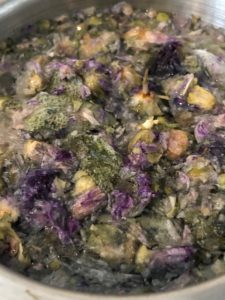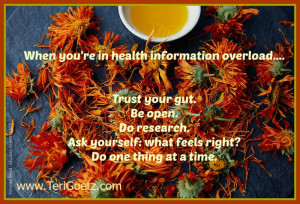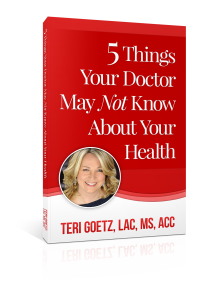It has been an intense flu and virus season, hasn’t it? My patients are asking for ways to strengthen their natural immune system and hopefully prevent getting sick. Besides following the CDC recommendations found here, there are natural ways to help build your immunity. The recommendations here are in addition to the everyday prevention strategies we too often overlook.
In Chinese medicine, the best way to fight an infection is with a strong natural immune system, called Wei Qi or, protective qi. When it’s strong, we weather exposure remarkably well. If it’s not, then disease enters the body. Protective qi (your natural immune system) is derived from a healthy diet (mostly plant based, not processed and, ideally, organic), moderate exercise, solid sleep, drinking plenty of water and herbal tea, breathing fresh air, and limiting our exposure to toxins. In other words, we absorb nutrients and utilize oxygen to create a strong immune system or protective qi. In addition, it is important to keep your gut in good health because up to 70-80% of your immune cells are found there.
The goal is to build a strong natural immune system so that, if you are exposed, you can beat the viral or bacterial load before it has a chance to replicate significantly. Some things you can easily do now to keep your body’s defenses strong:
- Remember that food is medicine, so eat a clean diet with LOTS of green leafy and vibrant-colored vegetables, which are full of antioxidants and nutrients. Look especially to broccoli, green leafies, red peppers, elderberries, blueberries, acai berries, sweet potatoes, miso, foods high in zinc, like oysters, assuming they’re clean, legumes –soak or sprout first, dark chocolate, hemp seeds, cashews, and spices as listed below.
— Note: red bell peppers and citrus are high in Vitamin C (red peppers are the highest!) and are thought to help build white blood cells. (Caution—citrus produces phlegm, so if you’re sick, find another form of Vitamin C.) - Exercise moderately. We’re not exactly sure how (there are many theories), but we do know that exercise builds immunity. You can over-exercise, especially if you’re sick. If you exercise regularly, this doesn’t mean increase the amount, just keep it steady. Moderate exercise, like taking 20-30+ minute walks, bicycling, or playing golf, all count as exercise and should be incorporated into daily life. Count your steps and work to gently increase them, if you’re falling far below the 10,000 step mark. (Though somewhat arbitrary, this number seems to be one that positively impacts health.) Get outside and breathe some fresh air!
- Yoga is a great way to stimulate your lymph system, which is one of your body’s first lines of defense. One of the most important jobs of the lymphatic system is to filter and transfer antibodies and good lymphocytes as well as bacteria. It signals your body’s infection fighting cells to keep you healthy.Dry brushing also helps increase lymphatic drainage. You can look this up online, but just remember that the lymph network is fairly superficial, so gentle, light strokes toward the heart are best
Natural Immunity from your kitchen:
Common kitchen herbs are powerful antiviral factories. Use them regularly—the fresher the better, but they’re also good as teas, tinctures and/ or in cooking (especially when added toward the end).

Oregano, thyme and sage are potent anti-viral herbs you likely have in your home kitchen. Make a simple tea from two or three of these herbs combined and drink one or two glasses per day. You can also make a stronger brew by putting 4 cups of water into a pot, adding a couple teaspoons of the herbs, an onion cut into quarters, some fresh smashed garlic and scallions (with their roots attached), and a nob of fresh ginger (ginger is believed to help the lymphatic system, build immunity and is a “harmonizer” and included in many recipes in TCM). Bring to a boil, then simmer for 10 minutes with a lid on (to keep the volatile oils intact). Strain and drink. You can also keep adding water, keeping it on a simmer throughout the day, drinking a cup every time you think of it. Think preventively, 2-4 times/day. If you’re sick, you can drink it every hour.
Oregano oil contains carvacrol and thymol, which are anti-viral, anti-bacterial, and anti-fungal. It’s an exceptional antiseptic. You can buy oregano capsules, as well, but do know that concentrated amount of oregano can be tough on your stomach, so avoid this if you have a history of stomach issues. Although, if you do get sick, it might be worth a little stomach upset to get over the cold faster. For sensitive individuals, use pure essential oil one drop in water or 1/2 cup of cold pressed flax oil or EVOO. If that is too strong, breaking it down into smaller dosages and drinking several times throughout the day is a good alternative.
One of the strongest antioxidants known is thyme. In herb or oil form, it has been used for centuries as an antiviral and antibacterial (on house surfaces, on the skin, and taken internally). Adding thyme to your food can be very beneficial. It also eases anxiety, increases circulation, treats tooth decay and mouth germs, and is even a great component in bug spray.
You can also make a very strong tea from these herbs and put it in a spray bottle (with or without alcohol) to wipe down kitchen counters, sinks, doorknobs, and light switches.
Add some white radish (daikon), black or red radish to the mix. (You can eat these raw in salads, grated or sliced). Daikon is a Chinese medicine superfood, as it helps with digestion, helps break down fats, boosts the immune and respiratory systems, is anti-inflammatory, helps regulate blood pressure and hormones, and even strengthens bones as it is very high in calcium. You can also stir fry these babies with a little scallion, ginger and/or garlic and enjoy warm. Or try juicing radishes or just munch on a couple once or twice per day.
Garlic is one of my favorite anti-microbials! It contains “allicin,” an antiviral compound found in either garlic extract or crushed garlic (it must be crushed in order to activate it). Once chopped, it’s recommended that you let it sit for 5-10 minutes before consuming. You can cook it (although that may decrease its potency) or eat it fresh. One recommended method is to hold a smashed piece in your mouth for 15 minutes between your teeth and gums or cheek, then consume it. Eat a few sprigs of parsley to both help neutralize its odor and to help the burning sensation in the digestive tract. Mixing it with food (like slicing it into fruit or salad) helps to make it less hot. As an alternative, you can buy garlic capsules, as well. Note that if you are a very hot person (canker sores, red face and eyes, feeling overly hot), this may not be the remedy for you or use a smaller quantity.
Black pepper is ideal for general prevention. Use freshly cracked, as commercially sold pepper is roasted and more irritating. Pepper helps you sweat, which is good at the beginnings of a cold and helps protect against viral infections. Add toward the end of cooking or freshly grind onto food.
Citrus seed extract (grapefruit seed) is a good remedy and preventive treatment. It’s quite bitter, but also non-toxic, and so good for long-term use. Excellent to use while traveling, it is especially good with a “damp” constitution or damp bodily conditions (so it’s also good for candida). A few drops added to laundry helps to sterilize clothes, or you can add a few drops to vinegar and water as a counter wash.
Turmeric activates T cells and is highly anti inflammatory.
Mustard greens help clear chest congestion and reduce clear white mucus. You can also use in a tea.
Dandelion has antiviral and antifungal properties.
Green tea contains catechins, which can help inhibit virus replication.
Other herbs to consider eating and or making into a tea which have anti-viral and anti-inflammatory properties:
Sweet basil
Holy basil
Fennel
Peppermint
Rosemary
Viola
My favorite natural immune system boosters in order (although all are quite effective)
Astragalus (Huang qi) – Astragalus is an adaptogen—a substance that helps the body deal with stresses (mental, emotional or physical). It is most often used to build your natural immune system, so you can use it daily. Astragalus is a root which can be boiled and drunk as a tea, and it’s slightly sweet. You can also add the tea to soups as the base stock (ideally, along with some mushrooms, see below). It is also available in tincture or capsules.
Mushrooms and fungus:
Mushrooms are often used in Traditional Chinese Medicine (TCM) to build your natural immune system. They help the respiratory system get rid of excess mucus and have antibiotic and anti-viral properties. They have an impressive nutritional profile, containing compounds such as anti-antioxidants, polysaccharides/beta glucans, terpenoids, sterols, and lipids making them one of the best things on the planet to boost and balance the immune system. They also lessen inflammation, have anti-tumor and anti-cancer effects and even lower cholesterol. They are believed to help increase white blood cell count to bolster immunity by increasing interferons (a group of signaling proteins in case of viral exposure, to heighten the body’s anti viral defenses). They also increase cellular oxygenation, increase NK (natural killer) cells. I can’t say enough about the value of mushrooms.
Another side benefit of mushrooms is that they treat the side effects of chemotherapy, as well. Please consult a health practitioner to find out more.
Mushrooms can be eaten fresh or dried and added to foods or beverages. There are many good companies out there selling them powdered. I add them to my coffee every morning. Please do your best to buy organic and well-sourced mushrooms.
For the sake of simplicity, I have listed them below in order of my personal preference. However, remember in Chinese medicine, we treat the individual, so some may be better than others for a you. Having said that, I encourage you to do your own research (readily available online—read several sources to make your best judgment) and I feel comfortable saying that most edible mushrooms have immune building qualities (we say Qi tonics) which can be exceptionally helpful.
Reishi (língzhī) – In TCM, this is thought to tonify immunity best. It is the king of mushrooms.
Shiitake (xiānggū) – These are said to be a very good source of interferons.
Maitake (hui shu hua)—Besides immune building, it also helps with diabetes as it helps to increase tissue sensitivity to insulin and appears to be protective of the pancreas.
Chaga: (bai hua rong) – Known as a super adaptogen, this slow growing mushroom helps form beneficial cytokines to stimulate white blood cells. It’s also good for cognitive function and very rich in antioxidants.
Lion’s Mane (hóutóugū)—Studies show lion’s mane can improve immunity by increasing the activity of the intestinal immune system, in part due to changes in gut bacteria. It is shown to reduce inflammation and oxidative stress. Studies show it could also prevent dementia and relieve mild symptoms of anxiety or depression.
Turkey Tail (yun zhi)—This ‘shroom also helps stop coughing in chronic cough and asthma. Also used for hepatitis. Good for general weakness.
Cordyceps (dong chong xia cao)—Besides the immune enhancing effects, cordyceps also treats coughs and respiratory infections.
Oyster (háogū)—Studies indicate it enhances immune function and may reduce cholesterol.
Schizandra Berries (Wu wei zi) – This berry is an adaptogen, and very high in antioxidants. Research indicates that it increases glutathione levels, reduces inflammatory cytokines, and improves liver function. It’s used for chronic cough and asthma and, if you’re in menopause, it can also help with hot flashes and calming the spirit. Throw them in smoothies or steep as a tea.
Many of these natural immune system building products (if not in your kitchen or garden) are available in your local health food store (yay, for supporting local shops!) or online. Try to buy organic when you can because you don’t want to burden your system with extra pesticides. I don’t ever recommend wasting money on bargain-priced or drug store supplements as these tend to sit on shelves too long, often are improperly prepared and/or sourced, and tend to be inferior products and thus not very effective. Do your research or ask a professional.
In traditional Chinese medicine, one size does not fit all and we put colds, flu, and other viruses into slightly different categories, depending on symptoms. I’d much prefer you talk to your doctor of Chinese medicine, but in lieu of that, I feel comfortable making these suggestions to improve your natural immune system. I hope to encourage and empower you to take charge of your own health.
Obviously, use best practices and do not go into public if you think you are infectious or were exposed to someone who was. If you’re well, consider getting some acupuncture to keep you balanced and strengthen your natural immune system. Because they are powerful, complicated and not a one size fits all, Chinese herbal formulas were not discussed here. However, if you do get sick, consult your practitioner immediately if you’d like to add that to your regime of treatment.
As always, please check herb-drug interactions. Plant medicine is very safe when used properly but can interact with medicines you may be taking. Please check with your healthcare provider. If you are pregnant or nursing, consult your doctor. It is always best to consult with a knowledgeable health care provider for your specific needs.
 We’ve become slaves to time and feel obliged to account for every moment. Work, appointments, deadlines, accomplishments, goals—they are all timestamped. All of these things are important, of course, but the end result is that we have forgotten how to just BE.
We’ve become slaves to time and feel obliged to account for every moment. Work, appointments, deadlines, accomplishments, goals—they are all timestamped. All of these things are important, of course, but the end result is that we have forgotten how to just BE. I’ve done it. Have you? A quick Google search about a symptom that has been bothering you or a recent diagnosis. Before you know it, the info is flooding your computer screen and you have more windows open than you can read in one day.
I’ve done it. Have you? A quick Google search about a symptom that has been bothering you or a recent diagnosis. Before you know it, the info is flooding your computer screen and you have more windows open than you can read in one day.
